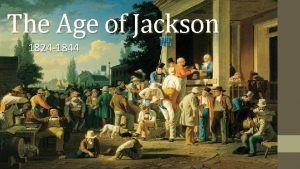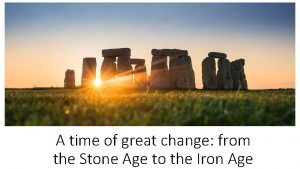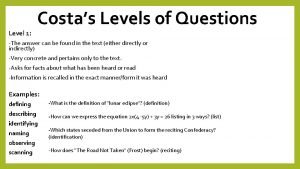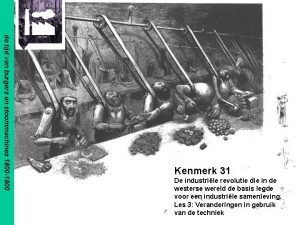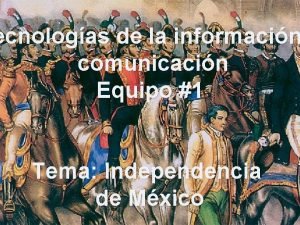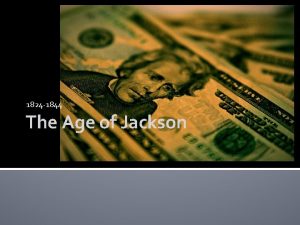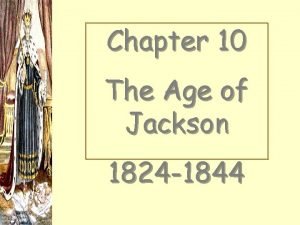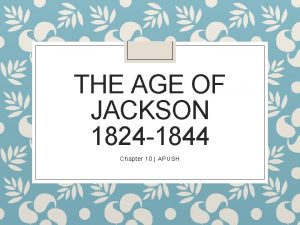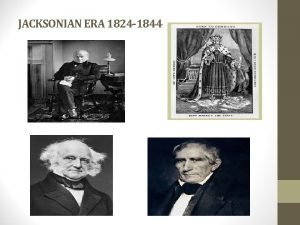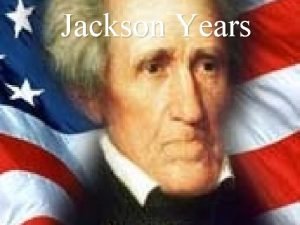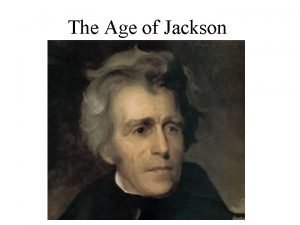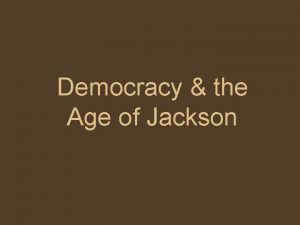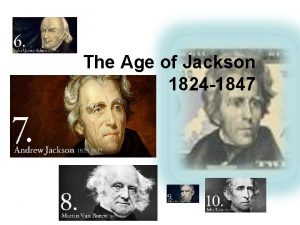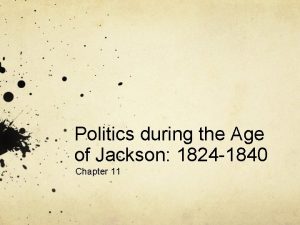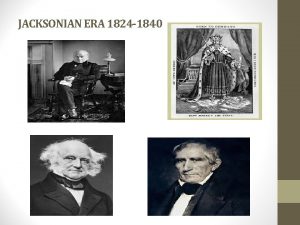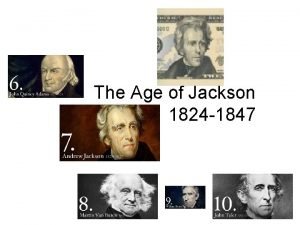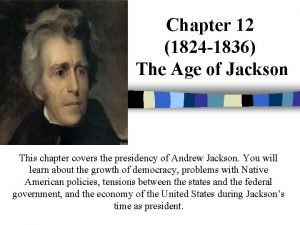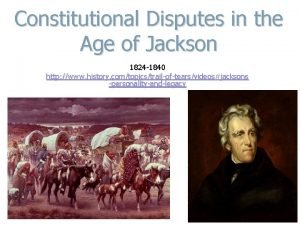The Age of Jackson 1824 1844 Essential Question

















- Slides: 17

The Age of Jackson 1824 -1844

Essential Question • For some the election of Andrew Jackson brought about a revolutionary change in politics for the common man as opposed to it being a continuation of the trend toward greater voter participation. Support, modify, or refute this contention using specific evidence.

Jacksonian Democracy • Rise of a Democratic Society • Egalitarian • Classless society • Equality of opportunity • Specifically, white males • The ‘self-made man’ was the hero of this time

Expansion of Democracy • Universal Male Suffrage • Omission of religious and property requirements • Party Nominating Conventions • Anti-Masons develop an anti-caucus system • Popular Elections • Reemergence of the Two-Party System • Needed to organize campaigns • Rise of Third Parties • Anti-Masonic, Workingmen’s • Increase in # of Elected Offices • Popular Campaigning • Negative Campaigning • Spoils System

Jackson vs. Adams • Election of 1824 • The “Corrupt bargain” • President John Quincy Adams • Attempts to expand American System • Internal improvements, aid to manufacturing

Quick Research • Tariff of 1828 – “Abominations” • What was it? • How did southerners view it? • Impacts on the South?

The Jackson Administration • Revolution of 1828 • Impact of the Western vote • Symbol of the “Common Man” • Self-made man • Presidential Power • Strict Constructionist • The Veto (12) • More than previous 6 presidents… combined • Maysville Road • The Kitchen Cabinet • Closest advisors • Not the official Cabinet

Eaton Affair • Jackson defends Sec. of War’s wife • Other Cabinet wives were gossiping and refuse to accept her • Most of the Cabinet resigns • VP John C. Calhoun replaced by Martin Van Buren

Indian Removal Act (1830) • Cherokee Nation v. Georgia (1831) • Cherokee not a foreign nation • Can sue at the SCOTUS • Worcester v. Georgia (1832) • Marshall sides with natives • Natives have a right to the land • Trail of Tears

Power Struggles • Nullification Crisis • • SC nullifies Tariff of Abominations Webster-Hayne Debates (1830) Tariff of 1832 Force Bill • • Invasion of SC imminent Jackson “Nullification and disunion are treason” • Compromise Tariff of 1833 (Clay & Calhoun) • The Bank War • Bank benefits the wealthy, at the expense of the commoners • Biddle and the early re-charter (1832) • Veto • Election of 1832 • Jackson wins big

Two Party System Democrats Whigs Issues Supported • • Local Rule Limited Government Free Trade Opportunity for white males • National Bank • Federal funds for internal improvements • Protective tariff (The American System) Major Concerns • • Monopolies National bank High Tariffs High land prices • Crime associated w/immigrants Base of Voter Support • The South and West • Urban Workers • New England Mid. Atlantic states • Protestants of English heritage (WASP) • Urban professionals

Jackson’s 2 nd Term • “Pet” Banks • Transfer of federal funds to state banks • Results: • Unregulated loans and speculation • Specie Circular • Purchases of federal land must be made in gold and silver • Results: • Bank notes lose value • Land sales plummet • Panic of 1837

The Van Buren Administration • Election of 1836 • Whig strategy fails • Van Buren’s Inheritance: • Bank failures, panic, and depression • Enforcement of the Indian Removal Act • Martin “Van Ruin”

Election of 1840 • “Log Cabin and Hard Cider” Campaign • “Tippecanoe and Tyler, too” • 78% turnout (white males) • A Whig victory, but… • Tyler: the Democrat in Whig’s clothing • First VP to assume the presidency

Image Analysis – Trail of Tears

Primary Source Analysis: King Andrew I • • • C – Historical Context A – Audience P – Purpose P – Point of View ?

Andrew Jackson’s Shifting Legacy • Read analyze a historian’s take on Andrew Jackson • Highlight the important pieces of the argument. • What is the evidence they use to support these pieces? • Guiding Questions • What arguments can be made that Jackson’s presidency does not warrant the notoriety that it has? • What arguments can be made that it is deserving of such notoriety? • Why is Jackson considered an emblem of American Democracy? • What is the counter argument? • What argument is presented that portrays Jackson as a president for the “Common Man”? • What event has become synonymous with Andrew Jackson? • How would Jackson defend this action? How would other criticize it?
 Guided reading & analysis: the age of jackson, 1824-1844
Guided reading & analysis: the age of jackson, 1824-1844 The age of jackson 1824-1844
The age of jackson 1824-1844 Romantic period 1798 to 1832
Romantic period 1798 to 1832 The romantic age (1798 to 1824)
The romantic age (1798 to 1824) Stone age, bronze age iron age timeline
Stone age, bronze age iron age timeline Iron age bronze age stone age timeline
Iron age bronze age stone age timeline Costas level of thinking
Costas level of thinking Prantsuse poeet 1844-1896
Prantsuse poeet 1844-1896 Buchingham palace
Buchingham palace Prantsuse poeet 1844-1896
Prantsuse poeet 1844-1896 1844 1910
1844 1910 1844 eerste telegraaflijn
1844 eerste telegraaflijn Mensagem dos 3 anjos
Mensagem dos 3 anjos Importance of joint stock company
Importance of joint stock company Components of accenture delivery suite ads
Components of accenture delivery suite ads Constituição 1824
Constituição 1824 Avolida
Avolida Juan seguin famous quotes
Juan seguin famous quotes
